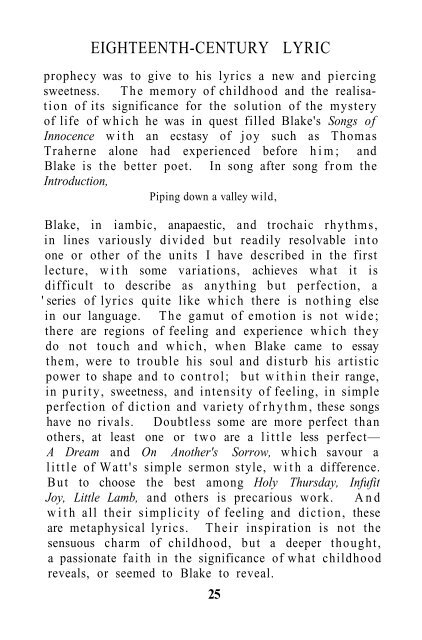- Page 3 and 4: HOGARTH LECTURES ON LITERATURELYRIC
- Page 5 and 6: LYRICAL POETRY FROMBLAKE TO HARDYH.
- Page 7: CONTENTSLECTUREI . INTRODUCTORY . .
- Page 10 and 11: LYRICALPOETRYand fieicer ferment of
- Page 12 and 13: LYRICALPOETRY,influence of the Hebr
- Page 14 and 15: LYRICALPOETRY.intended to be sung w
- Page 16 and 17: LYRICALPOETRY.or even, what is more
- Page 18 and 19: LYRICAL POETRY.Niebelungen measure
- Page 20 and 21: LYRICALPOETRYThe ecstasy of joy and
- Page 22 and 23: LYRICAL POETRY •Arnold, and poets
- Page 24 and 25: LYRICALPOETRY.had something to do w
- Page 28 and 29: LYRICALPOETRY.But the very complete
- Page 30 and 31: LYRICALPOETRYHear the voice of the
- Page 32 and 33: LYRICALPOETRYsimplicity, never in h
- Page 34 and 35: LYRICAL POETRYnot very happy attemp
- Page 36 and 37: LYRICALPOETRYBehold her single in t
- Page 38 and 39: LYRICAL POETRYgrandeur as well as b
- Page 40 and 41: LYRICALPOETRYBut it was not in this
- Page 42 and 43: LYRICALPOETRYpublication of Percy's
- Page 44 and 45: LYRICAL POETRYThen till't they gaed
- Page 46 and 47: LYRICALPOETRY" Tell me, thou bonny
- Page 48 and 49: LYRICALPOETRYeasily forgotten once
- Page 50 and 51: LYRICALPOETRYthe deck but his wings
- Page 52 and 53: LYRICALPOETRYDante's Paradiso affor
- Page 54 and 55: LYRICALPOETRYAround its unexpanded
- Page 56 and 57: LYRICALPOETRYweighted with the poet
- Page 58 and 59: LYRICAL POETRYstatement of a single
- Page 60 and 61: LYRICALPOETRYSuch space as I have,
- Page 62 and 63: LYRICAL POETRYAway, away from men a
- Page 64 and 65: LYRICALPOETRYSung to Adam and to Ev
- Page 66 and 67: LYRICALPOETRYthree that follow add
- Page 68 and 69: LYRICALPOETRYwere more gifted and a
- Page 70 and 71: LYRICALPOETRY"Now is done thy long
- Page 72 and 73: LYRICALPOETRY(Adonais), blank verse
- Page 74 and 75: LYRICAL POETRYI send my heart up to
- Page 76 and 77:
LYRICALPOETRYoff to murder Metterni
- Page 78 and 79:
LYRICAL POETRYtouches, the quaint t
- Page 80 and 81:
LYRICALPOETRYsubconscious. It is qu
- Page 82 and 83:
LYRICALPOETRYFor higher still and h
- Page 85 and 86:
TENNYSON, BROWNING, & SOME OTHERSMr
- Page 87 and 88:
TENNYSON, BROWNING, & SOME OTHERSpo
- Page 89 and 90:
TENNYSON, BROWNING, & SOME OTHERSKk
- Page 91 and 92:
TENNYSON,BROWNING, & SOME OTHERSant
- Page 93 and 94:
ARNOLD AND PRE-RAPHAELITE GROUPthe
- Page 95 and 96:
ARNOLD AND PRE-RAPHAELITE GROUPPast
- Page 97 and 98:
ARNOLD AND PRE-RAPHAELITE GROUPto a
- Page 99 and 100:
ARNOLD AND PRE-RAPHAELITE GROUPagai
- Page 101 and 102:
ARNOLD AND PRE-RAPHAELITE GROUPMan,
- Page 103 and 104:
ARNOLD AND PRE-RAPHAELITE GROUPtend
- Page 105 and 106:
ARNOLD AND PRE-RAPHAELITE GROUPfor
- Page 107 and 108:
ARNOLD AND PRE-RAPHAELITE GROUPAnd
- Page 109 and 110:
ARNOLD AND PRE-RAPHAELITE GROUPto s
- Page 111 and 112:
ARNOLD AND PRE-RAPHAELITE GROUPSlee
- Page 113 and 114:
ARNOLD AND PRE-RAPHAELITE GROUPmade
- Page 115 and 116:
ARNOLD AND PRE-RAPHAELITE GROUPThou
- Page 117 and 118:
ARNOLD AND PRE-RAPHAELITE GROUPand
- Page 119 and 120:
ARNOLD AND PRE-RAPHAELITE GROUPcoul
- Page 121 and 122:
ARNOLD AND PRE-RAPHAELITE GROUPWe a
- Page 123 and 124:
ARNOLD AND PRE-RAPHAELITE GROUPhabi
- Page 125 and 126:
THENINETIES"tury was most clearly f
- Page 127 and 128:
"THENINETIESthe same kinds of effec
- Page 129 and 130:
"THE NINETIESthe sixteenth, "In our
- Page 131 and 132:
"THE NINETIES"And why the sons of S
- Page 133 and 134:
"THE NINETIES"Fly with delight, fly
- Page 135 and 136:
"THE NINETIES"was an equally hard f
- Page 137 and 138:
"THENINETIES"age of Imperial Democr
- Page 139 and 140:
"THE NINETIESthat in the scattered
- Page 141 and 142:
THE NINETIES"something of the exper
- Page 143 and 144:
"THE NINETIES"Such lines from St Ma
- Page 145 and 146:
"THENINETIES"have so lightly touche
- Page 147 and 148:
"THENINETIES"the less romantic Prot
- Page 149 and 150:
"THENINETIESmetaphysical, religious
- Page 151 and 152:
"THENINETIES"that he edited that po
- Page 153 and 154:
"THENINETIES"and of Bailie and Aill
- Page 155 and 156:
"THE NINETIESDying Day of Death, an
- Page 157 and 158:
"THENINETIES"was a strange impressi
- Page 159 and 160:
'THE NINETIES"by the life and the p
- Page 161:
'THENINETIES"such thing, cry the ne
















